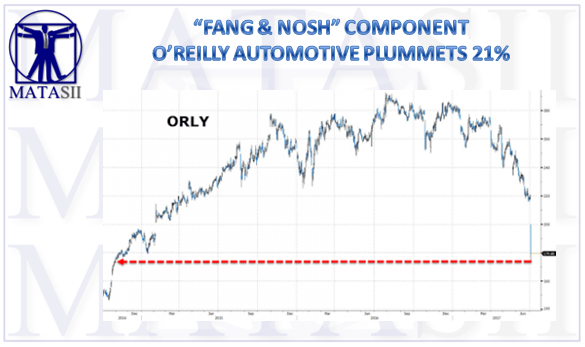"FANG & NOSH" COMPONENT, O'REILLY AUTOMOTIVE PLUMMETS
O'Reilly Automotive stock crashed as much as 21% on 7 times its average daily volume, its biggest drop since June 2012 dragging the share price to the lowest since October 2014, after the auto-parts retailer said same-store sales misses forecast for the second quarter.
The miss slammed ORLY peers:
- Advance Auto Parts plunged 16%,
- AutoZone tumbled 10%,
- While suppliers Standard Motor Products, Dorman Products and Motorcar Parts of America also dropped sharply.

Investors were disappointment as same-store sales rose only 1.7% in Q2, trailing O’Reilly’s own projection for growth of 3-5%, the company said in a statement earlier.
As usual it was the weather's fault: retailers blamed weak consumer demand at the start of the year on delayed tax refunds- although how that impacted second quarter results is not clear - and a mild winter that reduced the need to replace some car parts. O’Reilly’s Chief Executive Officer Greg Henslee said weak consumer demand continued into the second quarter despite signs of stronger sales earlier this spring according to Bloomberg.
“After exiting the first quarter and entering April on an improved sales trend, we faced a more challenging sales environment than we expected for the remainder of the quarter,” Henslee said. “While we are disappointed with our sales results in the first half of the year, we remain confident in the long-term health of our industry.”
O’Reilly’s sluggish sales rekindled concerns that competition from e-commerce could be eroding demand at brick and mortar stores, Consumer Edge Research analyst David Schick wrote in a note to clients Wednesday. “While our analysis does not see risk of the entire sector going online - we think the threat is meaningful for some categories and is unlikely to fade until visibility improves,” he said.
The huge miss added to concerns tied to Amazon’s expansion into the industry, adding to the selloff in the group.
Industry analysts, such as RBC's Scot Ciccarelli, said that apart from a mild winter, other possible causes for weak sales could be fewer cars entering peak repair stages of life cycle, less robust spending from Hispanic customers due to political concerns and beefed up competition from Wal-Mart.
As shown summarized below, industry analysts were hard pressed to come up with any positive spin to the disappointing data.
RBC (Scot Ciccarelli)
- Another miss for a sector under heavy scrutiny; "today’s moves imply that we are seeing a complete washout of the sector"
- Expects valuation arguments to accelerate given significant pressure on industry multiples
- Apart from a mild winter, other possible causes for weak sales could be fewer cars entering peak repair stages of life cycle, less robust spending from Hispanic customers due to political concerns and beefed up competition from Wal-Mart
- Sector perform, PT $201 from $280
JP MORGAN (Christopher Horvers)
- A good portion of the same store sales miss represents an industry-wide slowdown caused by the delayed "impact of vehicle age dynamics, mild winters and a softer consumer;" a portion of it is ORLY specific, as DIFM (do it for me) segment is more competitive
- Sees the lateral selloff as overdone; stocks overreacting to ORLY’s pre-announcement; would opportunistically buy AZO and AAP
- Neutral, PT $210 from $295 to reflect weaker sales and EPS outlook
CONSUMER EDGE (David Schick)
- Weaker comp. sales confirming "softer trends persist" narrative and resultant questions around e-commerce competition
- Current headwinds driven by weather, used pricing and higher gas prices with online competition possibly weighing on P/E multiple
- Doesn’t see risk of entire sector going online, but "threat is meaningful" for some categories and is unlikely to fade until visibility improves
- Overweight, PT $310
Assuming that it was not the "mild winter" that was to blame for the steep drop in end-demand, today's profit warning is just the latest confirmation that at a time when the Fed is actively hiking interest rates, the US consumer remains in the doldrums, and consumer spending continues to recede, suggesting that the next relevant phase for the US economy is not expansion as the Fed hopes, but contraction, also known as recession.


